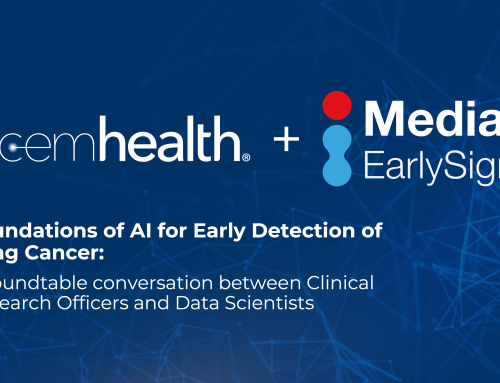This Week in Clinical AI: Episode 4 (8/21/23)
In This Week in Clinical AI episode 4, we will discuss the latest advancements and success stories in clinical AI. From the groundbreaking work at Cedars Sinai Medical Center to the emergence of virtual dermatology clinics, AI is proving to be a powerful tool in improving patient outcomes.
This Week in Clinical AI Episode 4 Topics:
- 0:00 Introduction
- 0:20 Topic 1: Cedars-Sinai Charts Healthcare’s Future with Artificial Intelligence
- 1:27 Topic 2: Groundbreaking AI-Powered Dermatology Practice Launches in Massachusetts, Meets Unprecedented Demand
- 2:41 Topic 3: Generative AI Helps Providence Make Specialty Referrals
Early Detection of Pancreatic Cancer with AI
Pancreatic cancer is known for its aggressive nature and low success rates in treatment. Therefore, early detection is crucial in improving the chances of successful treatment. Cedars Sinai Medical Center has been at the forefront, utilizing AI to identify pancreatic cancer at an early stage using medical images.
Specifically, in collaboration with leading researchers, Cedars Sinai aims to leverage AI algorithms to analyze images and identify potential signs of pancreatic cancer. This approach follows a similar path to a research study published in May in Nature Medicine, where a Harvard researcher successfully identified higher risk of pancreatic cancer by analyzing electronic health records (EHR) data.
In summary, by combining AI with medical imaging, healthcare professionals can identify patients with a higher risk of pancreatic cancer,allowing for prompt treatment interventions. The work at Cedars Sinai showcases how AI can transform cancer care and improve patient outcomes through early detection. [1]
Virtual Dermatology Clinics: Combining AI with Board-Certified Dermatologists
Access to dermatology specialists can sometimes be challenging, especially for routine check-ups or minor concerns. However, a Massachusetts-based company called Piction is changing that narrative by creating a virtual dermatology clinic powered by AI and board-certified dermatologists.
The concept is simple: patients can take photos of their skin conditions and submit them to the virtual clinic. AI algorithms perform an initial review of the images, followed by a final assessment by board-certified dermatologists. This approach ensures providers can give accurate diagnoses and appropriate treatment recommendations.
Additionally, virtual dermatology clinics provide numerous benefits to patients and providers. First, it addresses concerns regarding the availability of dermatology appointments. Next, it reduces the need for biopsies and laboratory processing time. Moreover, it provides patients with rapid access to professional medical advice. Having AI combined with expert knowledge in dermatology means that patients can receive timely treatment or gain peace of mind about their condition. In conclusion, virtual dermatology leverages technology to improve access and efficiency in dermatology care. [2]
The Role of Generative AI in Specialist Referrals
Providence has implemented generative AI in a novel way to improve specialist referrals. Specifically, the integration of MedPearl, a generative AI tool, into their health record system has empowered primary care physicians to make more accurate decisions regarding specialist referrals.
As a result, physicians can now use MedPearl to determine if a specialist referral is necessary, saving valuable time and resources by reducing unnecessary referrals. Approximately 20% of physicians reported that MedPearl improved their specialist referral process, while another 20% found that they could treat the patient themselves, avoiding the need for a referral altogether.
This groundbreaking use of generative AI not only streamlines the referral process but also ensures that patients receive appropriate care from the right specialists. In summary, it serves as a powerful tool for primary care physicians, enabling them to make informed decisions and enhance the overall patient experience. The integration of AI has transformed the referral process to be more efficient and effective. [3]
This Week in Clinical AI Episode 4 Wrap-Up
As we have seen, clinical AI is rapidly advancing and transforming the healthcare landscape. Specifically, from early cancer detection to virtual dermatology clinics and improved specialist referrals, AI is revolutionizing patient care in numerous ways. Moreover, the integration of AI technology with medical expertise creates the potential for improving patient outcomes, enhancing access to care, and optimizing resource allocation.
Consequently, healthcare organizations must embrace the potential of clinical AI and strive to implement these innovative solutions effectively. By leveraging AI algorithms, medical professionals can provide faster diagnoses, personalized treatment plans, and ultimately improve patient satisfaction and well-being.
the recent developments in clinical AI demonstrate its significant impact on healthcare. The work at Cedars Sinai Medical Center, the establishment of virtual dermatology clinics, and the utilization of generative AI for specialist referrals are just a few examples of how AI is revolutionizing patient care. Looking ahead, as the adoption of clinical AI continues to grow, we can expect more breakthroughs, enhanced efficiency, and improved patient outcomes in the near future.
